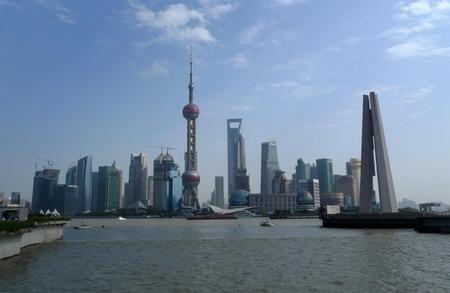 China's financial hub, Shanghai will overtake London as the world's second-largest financial center after New York in 10 years, according to a recent survey conducted by law firm Eversheds.
China's financial hub, Shanghai will overtake London as the world's second-largest financial center after New York in 10 years, according to a recent survey conducted by law firm Eversheds. The survey, which interviewed 600 senior business decision-makers in the cities of London, Mumbai, New York, Shanghai and the United Arab Emirates, revealed that London was facing a challenge from Shanghai in terms of its financial role on the global stage, based on a surge in confidence among corporate bosses in the Chinese city.
Most respondents said New York would continue to hold the top position as the most important global economic center.
According to London-based Eversheds, 91 percent of senior businesspeople in Shanghai are confident of their economic outlook over the next 12 months, mainly based on signs of growth and a pick-up in business. That compares with London where only 22 percent are confident, the lowest figure among the five cities.
"Confidence in the economy is a clear advantage for Shanghai - our research shows there is a clear divide between the more established centers of the West and the emerging economies of the East," said Stephen Mok, a partner at Eversheds.
The report showed that 87 percent of business leaders across the globe said the recession has significantly changed the structure of the world economy, and the established financial centers face a growing challenge from the emerging economies of the East.
"The high level of confidence in Shanghai is set against a backdrop of significant government stimulus to boost the domestic economy," it said.
China, ahead of the US and Europe, has heralded signs of a recovery from the global financial crisis on the back of the central government's 4 trillion yuan ($586 billion) stimulus package.
In March the State Council sanctioned turning Shanghai into an international financial hub by the end of 2020.
"There's little doubt that Shanghai would emerge as an important global financial center within the next decade given that the Chinese economy will become No 1 or No 2 in the world and because of the growing global status of the yuan," said Hubert Tse, managing director and head of international business at law firm Yuan Tai.
A total of 29 percent of businessmen in Shanghai said there was "too much regulation affecting business", while 33 percent said "there's not enough regulation to protect business".
Challenges affecting Shanghai's claim as a global financial center include the timing of when the yuan will become fully convertible and whether (and how effectively) adequate laws and regulations and a regulatory regime would be put in place, Tse said.





